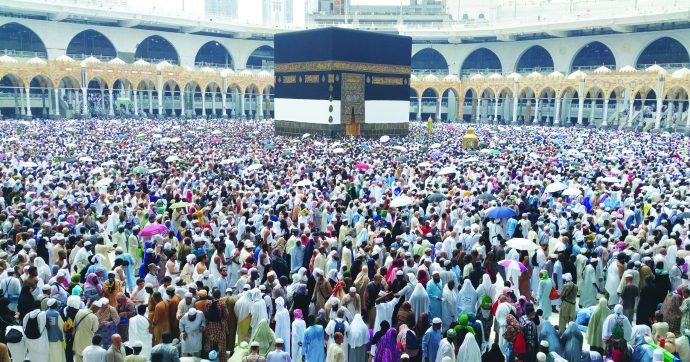Every year, more than a million Muslims from all over the world will congregate in Mecca to perform the Hajj. This spiritual journey can be challenging, but being infected with an illness will make it worse and may disrupt pilgrims from their rituals.
The Hajj is one of the largest gatherings in the world and having that many people in such a limited space makes it easy for diseases to spread. Indeed, many outbreaks have occurred before during the Hajj, including meningococcal disease, gastrointestinal illnesses, as well as respiratory tract infections, like pneumonia and flu.
Many factors lead to the outbreaks: the brutal heat, dehydration, exhaustion, staying in close quarters, as well as skin contact. If you are planning to take your child or older family members with you, you need to take extra provisions to protect them (and yourself too!).
Risk of transmission
Three types of transmission risk are present during the Hajj:
- Risk of importing communicable diseases to the Hajj. Pilgrims from certain countries where outbreaks are currently taking place may take these diseases to the Hajj with them. Of concern is cholera, poliomyelitis, yellow fever, Zika, Chikungunya, dengue, seasonal influenza, measles, and Ebola.
- Risk of transmission of communicable diseases during the Hajj. The risk of local transmission increases during the Hajj due to overcrowding, possible food contamination, and less-than-ideal hygiene and sanitation. This includes meningococcal disease, food- and water-borne diseases, malaria, and respiratory diseases like tuberculosis and pneumonia.
- Risk of exporting communicable diseases after the Hajj. Pilgrims infected by these diseases may trigger an outbreak in their home country when they return. There are also concerns of MERS-CoV transmission by pilgrims in contact with camels or those who were admitted to hospital in Mecca.
Safety measures
In their effort to prevent outbreaks, the Saudi Ministry of Health has certain regulations for pilgrims and workers entering Mecca. The National Fatwa Council also encourages the use of vaccination to curb the spread of contagious diseases.
- Meningococcal vaccine: Required for all Hajj and Umrah pilgrims, seasonal workers, residents of Mecca and Medina, and any person who may get in contact with pilgrims. Since the introduction of this regulation in 2002, cases of meningococcal diseases have reduced significantly.
- Yellow fever vaccine: Required for all travellers arriving from countries at risk of yellow fever transmission. These countries are mainly located in Africa (e.g. Angola, Nigeria, Senegal, Kenya, Congo) and South America (e.g. Argentina, Venezuela, Colombia, Peru).
- Poliomyelitis vaccine: Required for all travellers arriving from countries with circulating poliovirus or at risk of polio reintroduction. The countries include Afghanistan, Nigeria, Pakistan, Myanmar, Ethiopia, Somalia, South Sudan, Syria, and Yemen.
- Seasonal influenza vaccine: The most recent influenza vaccine is recommended for all pilgrims, especially for pregnant women, children under 5 years old, adults over 65 years old, and individuals with chronic diseases.
Additional vaccine for protection
The Malaysian government also recommends the pneumococcal vaccine for Hajj pilgrims above 50 years old and individuals with health problems like asthma, diabetes, or lung or kidney diseases. Two types are available: the pneumococcal polysaccharide vaccine, which protects against 23 strains of pneumococcus, and the pneumococcal conjugate vaccine, which protects against 13 strains. These vaccines prevent pneumonia, which is one of the primary causes of hospitalisation for Hajj pilgrims. The conjugate vaccine prevents carriage and spread to locals.
Have a healthy Hajj!
To keep infections away and prevent from spreading diseases, practise these tips:
- Wash hands with soap, especially after coughing and sneezing, after using toilets, before handling and consuming food, and after touching animals.
- Use disposable tissues when coughing or sneezing and dispose it in the waste basket.
- Try your best to avoid hand contact with the eyes, nose and mouth.
- Wear masks, especially when in crowded places.
- Avoid direct contact with people who appear ill and do not share personal belongings.
- Avoid close contact with animals, particularly camels or sick animals, when visiting farms, markets, or barn areas.
- Avoid drinking raw camel milk/urine or eating meat that has not been properly cooked.
The Hajj is a sacred passage and we want to perform our obligations at our best. Undeniably, it will be a challenging experience for most of us, especially for children and seniors. If you or your family fall sick and need to be hospitalised, it will be a hassle and your Hajj will definitely be interrupted. Because of that, it is crucial to be fully prepared and to do our best to protect ourselves and loved ones. With vaccination and proper hygiene habits, you will be able to do that.
An educational contribution by Malaysian Paediatric Association.






Comments